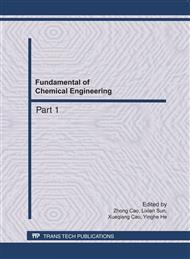p.416
p.420
p.427
p.431
p.435
p.439
p.444
p.452
p.457
Water Recycling from Electroplating Effluent Using Membranes
Abstract:
The membrane integrated process including nanofiltration (NF) and reverse osmosis (RO) had more advantages in recycling the electroplating effluent than conventional physical and chemical methods. Separation experiments with different kinds of membranes were carried out in pilot scale installation using industrial effluents for more effective desalination. The selective rejection of different ions in NF and RO process was investigated with the Donnan effects and solution-diffusion theory to check its consistence. Although NF membranes had a higher permeate flux and better ion selectivity even under a relatively low operating pressure, RO membranes prevailed in rejection of toxic heavy metal ions and COD and would approach a higher potential for producing feed water of industrial cooling system.
Info:
Periodical:
Pages:
435-438
Citation:
Online since:
May 2011
Authors:
Keywords:
Price:
Сopyright:
© 2011 Trans Tech Publications Ltd. All Rights Reserved
Share:
Citation:


